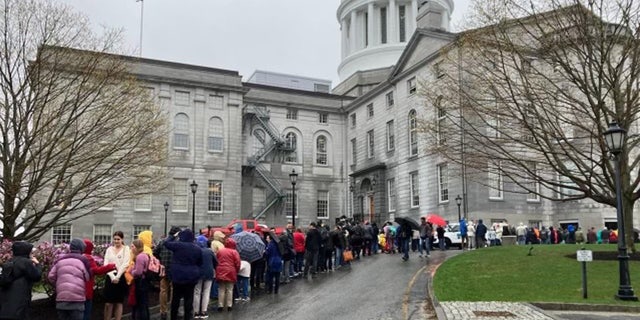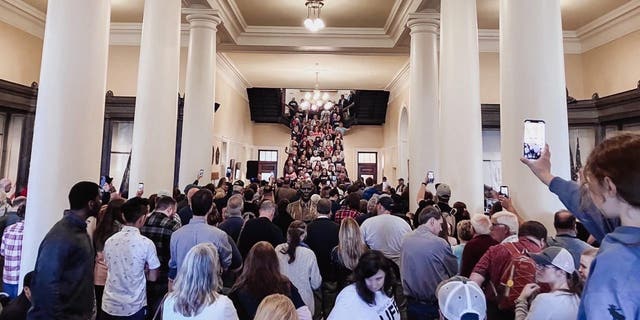Hundreds of pro-lifers dominate marathon all-night hearing on Maine’s no-limits abortion law
Hundreds of pro-life Mainers testified against a bill that would remove most limitations on abortion in the state in an overnight, nearly 20-hour long hearing on the proposal.
Democratic Gov. Janet Mills introduced the bill in January 2023 to alter the state’s law from allowing abortions after fetal viability in the case of the health or life of the mother, to allowing abortion after the point at which the fetus can survive by itself outside the womb.
During the public hearing that began Monday, more than 675 pro-lifers signed up to testify against the legislation, reportedly lining up as early as 7 a.m. for the 10 a.m. signup to speak.
With testimonies from a multitude of pro-life and only 65 speaking in favor of the bills, the hearing lasted over 19 hours into Tuesday morning — a historically long public hearing in the state of Maine.
OREGON DEMS ADVANCE SWEEPING BILL AIMED AT PROTECTING ABORTION, GENDER SURGERY
State Rep. Laurel Libby, who testified at the hearing, described the “remarkable” movement of pro-lifers showing up to block to the bill.
“What I’ve seen is that there is not just enthusiasm for the public hearing Monday and yesterday, but to continue the efforts moving forward and make sure that people are eager to keep reaching out to their legislators and advocating for them to kill this bill,” Libby told Fox News Digital in an exclusive interview.
FOX NEWS POLL: TWO-THIRDS SAY ABORTION PILL SHOULD BE LEGAL
Libby was the last to give a statement at 7:20 a.m., the morning after the hearing started.

“Yesterday and today, for the past 18 hours, we have seen the heart of Maine… We’ve seen the indomitable spirit of true Mainers… Their pure intention to speak up for life and to speak up for those who cannot speak for themselves. This committee has forgotten the meaning of we the people and has adopted the philosophy of the tyranny of the majority,” she said.
Libby also decried the committee’s decision to limit pro-lifers comments to one minute, while others got to speak for two minutes.

Closer to the start of the hearing, Maine Attorney General Aaron Frey was asked if there should be any reasonable restrictions on abortion.
“What I believe is that the place for which that decision to be made about how a woman exercises her reproductive choices is best trusted to the woman in consultation with a medical professional,” Frey said. When asked if there are any legal protections for a child, Frey said “this is a woman making a decision about what to do with her body… There isn’t a live child that’s out at this point, that this decision is concerned with.”
Hundreds of pro-life residents stayed the night to speak out against the abortion proposal.
“When did babies become the enemy?… How have we sunk so low to consider killing full term babies as acceptable?” one woman said.
“There is no logical reason we show allow LD 1619 to pass in Maine,” another resident said.

Zoey Hutchings from Fairfeild asked: “Is your life precious to you? Aren’t you glad that your mother or grandmother understood that your life was precious?… All life has value whether someone else thinks it or not.”
Anne Fowler, a minister in the Episcopal Diocese of Maine and supporter of the pro-abortion legislation, was near the start of the hearing if there’s a difference between the rights of a baby one day before and the day after it is born. “I measure value and rights on the basis of potential versus actuality,” she responded.
Despite already allowing abortion up until fetal viability, usually around 24 weeks of pregnancy, the new proposal suggests changes to “the standard for when an abortion may be performed after viability to when a licensed physician determines that it is necessary instead of when it is necessary to preserve the life or health of the mother.”
The new law also “removes the criminal penalties for performing an abortion without being licensed as a physician, physician assistant or advanced practice registered nurse, and for performing an abortion after viability of the fetus when it was not necessary for the preservation of the life or health of the mother.”
Read the full article Here


